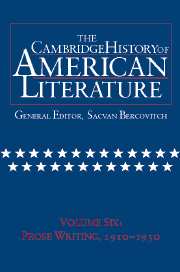Book contents
- Frontmatter
- Introduction
- A Cultural History of the Modern American Novel: Introduction
- 1 A Dream City, Lyric Years, and a Great War
- 1 The Novel as Ironic Reflection
- 2 Confidence and Uncertainty in The Portrait of A Lady
- 3 Lines of Expansion
- 4 Four Contemporaries and the Closing of the West
- 5 Chicago’s “Dream City”
- 6 Frederick Jackson Turner in The Dream City
- 7 Henry Adams’s Education and The Grammar of Progress
- 8 Jack London’s Career and Popular Discourse
- 9 Innocence and Revolt in the “Lyric Years”: 1900–1916
- 10 The Armory show of 1913 and the Decline of Innocence
- 11 The Play of Hope and Despair
- 12 The Great War and The Fate of Writing
- 2 Fiction in a Tme of Plenty
- 3 The Fate of Writing During the Great Depression
- Fictions of the Harlem Renaissance
- Ethnic Modernism
- Chronology
- Bibliography
- Index
1 - The Novel as Ironic Reflection
from 1 - A Dream City, Lyric Years, and a Great War
Published online by Cambridge University Press: 28 March 2008
- Frontmatter
- Introduction
- A Cultural History of the Modern American Novel: Introduction
- 1 A Dream City, Lyric Years, and a Great War
- 1 The Novel as Ironic Reflection
- 2 Confidence and Uncertainty in The Portrait of A Lady
- 3 Lines of Expansion
- 4 Four Contemporaries and the Closing of the West
- 5 Chicago’s “Dream City”
- 6 Frederick Jackson Turner in The Dream City
- 7 Henry Adams’s Education and The Grammar of Progress
- 8 Jack London’s Career and Popular Discourse
- 9 Innocence and Revolt in the “Lyric Years”: 1900–1916
- 10 The Armory show of 1913 and the Decline of Innocence
- 11 The Play of Hope and Despair
- 12 The Great War and The Fate of Writing
- 2 Fiction in a Tme of Plenty
- 3 The Fate of Writing During the Great Depression
- Fictions of the Harlem Renaissance
- Ethnic Modernism
- Chronology
- Bibliography
- Index
Summary
Novelists as different as Henry James and Theodore Dreiser began the twentieth century as they ended the nineteenth, torn by conflicting allegiances. On one side, their openness to what Henry James called the “strange irregular rhythm of life,” and thought of as the “strenuous force” that kept fiction on its feet, drew them toward history and a shared story of conquest, the taming of a continent and the making of a new nation and a new people, as we see in a range of titles, including James’s The American (1877), William Dean Howells’s A Modern Instance (1882), Willa Cather’s O Pioneers! (1913), Gertrude Stein’s The Making of Americans (1925), Dreiser’s An American Tragedy (1925), John Dos Passos’s U.S.A. (1938), and Richard Wright’s Native Son (1940). On another, they were drawn toward what James called the “romantic” and described as the “beautiful circuit and subterfuge of our thought and our desire” – things, he added, that “we never can directly know.” Like Flaubert, James wanted to tidy up the loose, baggy traditions of the novel. Even more than Flaubert, he associated the novel’s looseness with history. Simply by placing human thought and desire under the aspect of the “beautiful,” defined in terms of order and subtle indirection (“circuit and subterfuge”), James evoked the lyrical tradition of the nineteenth century, in which self-examination became a prelude to self-transcendence and the journey toward the self’s interior became a covert preparation for a journey up and out of time itself, for the solitary reader as well as the solitary singer.
- Type
- Chapter
- Information
- The Cambridge History of American Literature , pp. 10 - 14Publisher: Cambridge University PressPrint publication year: 2002

